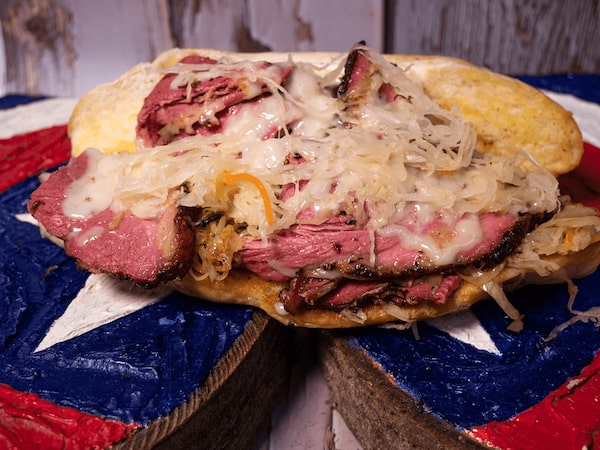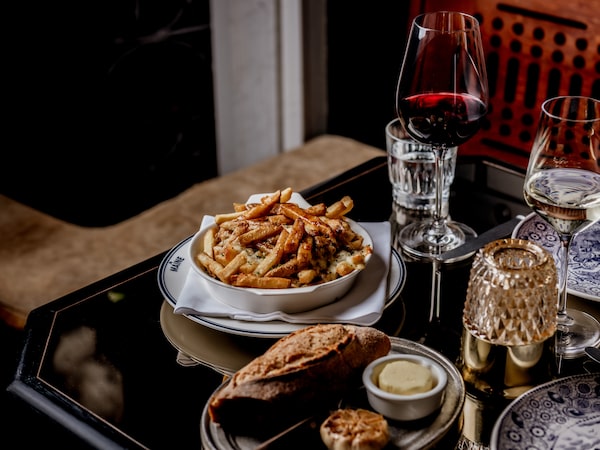One in a regular series of stories. To read more, visit our Inspired Dining section.
When he launched Bodean’s 20 years ago, Montreal native André Blais predicted an appetite in London for authentic American-style barbecue. While his platters sold well, his hot sandwiches hardly flew out the door, especially not at dinnertime.
During the pandemic, Blais had an idea he thought might change that: premium submarine sandwiches like the kind he grew up with, stuffed with hot Montreal-style smoked meat or pastrami and served with fries or poutine, from lunch to late night.
He trialled the concept at a test kitchen in southwest London, delivering 7,000 sandwiches (as well as hotdogs) and securing funding for a permanent storefront, opening this month on a popular pedestrianized street. The name? Gerry’s, after his father, a veteran patron of Schwartz’s on St. Laurent Boulevard.
“Bodean’s proved there was a niche here for American smoked barbecue, but Montreal smoked meat hadn’t yet taken off here,” says Blais. “We’re educating the English culture that hot sandwiches can be treated as a hot meal.”
André Blais whose storefront Gerry’s brings Montreal smoked meat to London, UK.James Purssell & Lingerie Naturally/Handout
With his COVID-era bestseller, the house-smoked pastrami Reuben sub, Blais says he was introducing a concept the U.K. had never experienced, but that’s not entirely true.
“Salt beef,” a tender brine-soaked deli meat, was brought to London by the Irish centuries ago but perfected by Jewish immigrants, who pile it on bagels for takeout. Yet the chewy, flavourless bagels are anathema to what North Americans are used to, and the thick-cut beef tends to be tough and greasy. Nor are chips topped with gravy and cheese unfamiliar, albeit normally dished from fairground stands and old-fashioned “chippies.”
Rather, Gerry’s finds itself part of a wider trend for Montreal’s high-standards, no-nonsense, genre-bending cooking. Londoners have developed a taste not only for Montreal’s most exportable dishes and delicacies, but also for its singular vibe – a lack of pretension and surplus of youthful attitude that is very much welcome in this booming gastro landscape.

The Montreal smoked meat Reuben was the top seller at Blais’s test-kitchen.HANDOUT/Handout
At nearly 10 years old, the Good Egg probably marked the dawning of Montreal tastes in London, channelling owner Joel Braham’s Montreal youth and passion for Israeli flavours. In the north London location, where tables are nigh on impossible during the brunch shift, Braham trialed smoked-trout kugel, smoked meat on challah and a rum cocktail called Manny Shevitz during the dinner service. Among his more recent ventures is the Good Bagel, a Montreal bakery selling a “Bagels de Montréal” tote bag and a “Boyz II Mensch” baseball cap.
At the comfort-food brasserie Morty & Bob’s, owner Charlie Phillips cites a general vogue for what he calls “Jew food,” an east-west fusion beloved by the Jewish diaspora. “I think tying into the Montreal influence is the Tel Aviv influence,” he says, referencing Mediterranean slow-cooked lamb, roasted cauliflower and pickled vegetables. “Montreal has become New York-ified as well, so the style comes here from New York via Montreal.”

A salt beef bagel from The Good Egg’s new Montreal bakery, The Good Bagel. The restaurant channels owner Joel Braham’s Montreal youth and passion for Israeli flavours.Instagram/Handout
The titular Morty is Phillips’s late grandfather, a Montreal restaurateur (Bob is his maternal grandfather, who traded produce at London’s Spitalfields Market). Though Phillips grew up in London, he says he visits the family back in Quebec twice a year. “I’ve been immersed in Montreal, from Moishes to Schwartz’s, so for me it’s very much engrained. A lot of my time was spent in Côte Saint-Luc, then we’d go out with our cousins and end up in a pool of poutine, so I got a real wide introduction.”
Passing that along to his customers has allowed Morty & Bob’s to grow from a grilled-cheese market stall in east London to three dine-in locations that riff on Montreal staples, plus a chicken schnitzel with Corn Flake crust his grandmother pioneered. His smoked salmon comes on a New York-style “everything bagel,” though he avoids the word “lox,” because “nobody here knew what the hell we were talking about. When I’m not a purely Montreal restaurant it’s hard to communicate to your customers things like lox, or matzo ball soup.” Part of the challenge was pushing an alternative to theme-dining like, say, Indian street food, or Korean barbecue. “London is very concept-based,” he says. “It’s hard to find those all-rounder places. One aim of mine is to make sure I’m including lots of different influences.”
Last November Winnipegger Michael Robins opened his fine-dining restaurant Sune with a beef tartare croque monsieur he says was inspired by a night out at Montreal bistro L’Express.

The beef tartare croque monsieur at fine-dining restaurant Sune, which opened last November.Instagram/Handout
“I went with a couple of industry friends and we thought, we’re just gonna order these two dishes separately and do this little hack, and it was the most magical thing. I made them promise not to steal it.” Trained in France, Robins says he’d always wanted to combine two classic French dishes, “but I thought I’d get in trouble – it sounds gimmicky and it’s not technically sound.” Instead, the tartare croque has put Sune on the map.
Surely not the first chef to insist he visits Montreal “solely for the gluttonous, rich, over-the-top, celebratory food,” Robins has some clear favourites: Joe Beef, Au Pied de Cochon and Vin Papillon, where the signature “salad” is a tower of cured ham and cheddar drizzled with beurre noisette.
“Montreal chefs are just unapologetically true to themselves,” he says. “The French are so steeped in tradition. Montreal is a baby in comparison, with younger chefs that aren’t bound by doing things in a certain way. They say, ‘I respect this, but what if I do it like this?’ Some of the best chefs in London right now are doing versions of that.”
It’s one of the reasons diners and critics often mistake a Montreal influence for California, New York or pan-European. “The cooking is rooted in classic French technique and adapted throughout the years,” says Robins. “There’s no traditional ‘mother sauce.’ ”

Chef Johnny Lake of the South London restaurant Trivet prepares a Hot Tongue Bun, a hot cow’s tongue served on a bun with mayo and pickles.Instagram/Handout
The south London restaurant Trivet shares this literal je ne sais quoi. Launched in 2019 by Jonny Lake, a veteran of Montreal’s Institut de Tourisme et d’Hotellerie, it weathered the pandemic with a parade of sweetbreads and Anjou pigeon, served incongruously with frites and wines from Armenia and Georgia. When Michelin came around bearing stars, reviewers alluded to Lake’s informal, high-quality cooking – a brazen lack of fuss unique in haute European hospitality. Canadians expected no less from the chef who began his career cooking for Santropol Roulant and manages to squeeze some version of a hotdog on nearly every menu he devises. Currently available for lunch: hot cow’s tongue served on a bun with mayo and pickles.
A different brand of insouciance is on display at the Maine, a flashy, ambitious brasserie in a bijou Mayfair location with live jazz in the ornate dining room. It was opened in 2021 by Montreal native Joey Ghazal as a satellite of his Maine restaurant in Dubai where the self-titled “gastropreneur” lives part time. But its roots are in Montreal, where Ghazal learned about restaurants from the ground up, at La Queue de Cheval, and spent his off hours at supper clubs such as Buonanotte and Globe.

A Montreal-style poutine on the menu at The Maine, an ambitious brasserie in a bijou Mayfair location in an ornate dining room. It was opened in 2021 by Montreal native Joey Ghazal as a satellite of his Maine restaurant in Dubai.Lateef Okonnu/Handout
“Montreal chefs are like pirates,” says Ghazal. “They take classic Old World dishes and breathe new life into them.” He cites a half dozen “trailblazers,” including Chuck Hughes of Garde Manger and David McMillan and his restaurant empire on Notre-Dame West. “They really put Montreal on the map and I wanted to recreate that feeling.”
The Maine does classic tartares, Montreal poutine and a Bloody Shell cocktail with Clamato. It dabbles in steaks – such as the big, brawny, expensive ribeye, accessorized by a hunk of bone. And a major part of its DNA is the raw bar, inspired by Ghazal’s summers in Maine, the state (“All Montrealers move to Maine in the summer – it’s the Great Migration”). Factor in the slightly debauched burlesque act that headlines Thursday through Saturday, and Ghazal can’t help but draw a line back to the bons vivants of his hometown.
“The attitude, the culinary mashup, the boisterous tavern energy … that’s classic Montreal.”